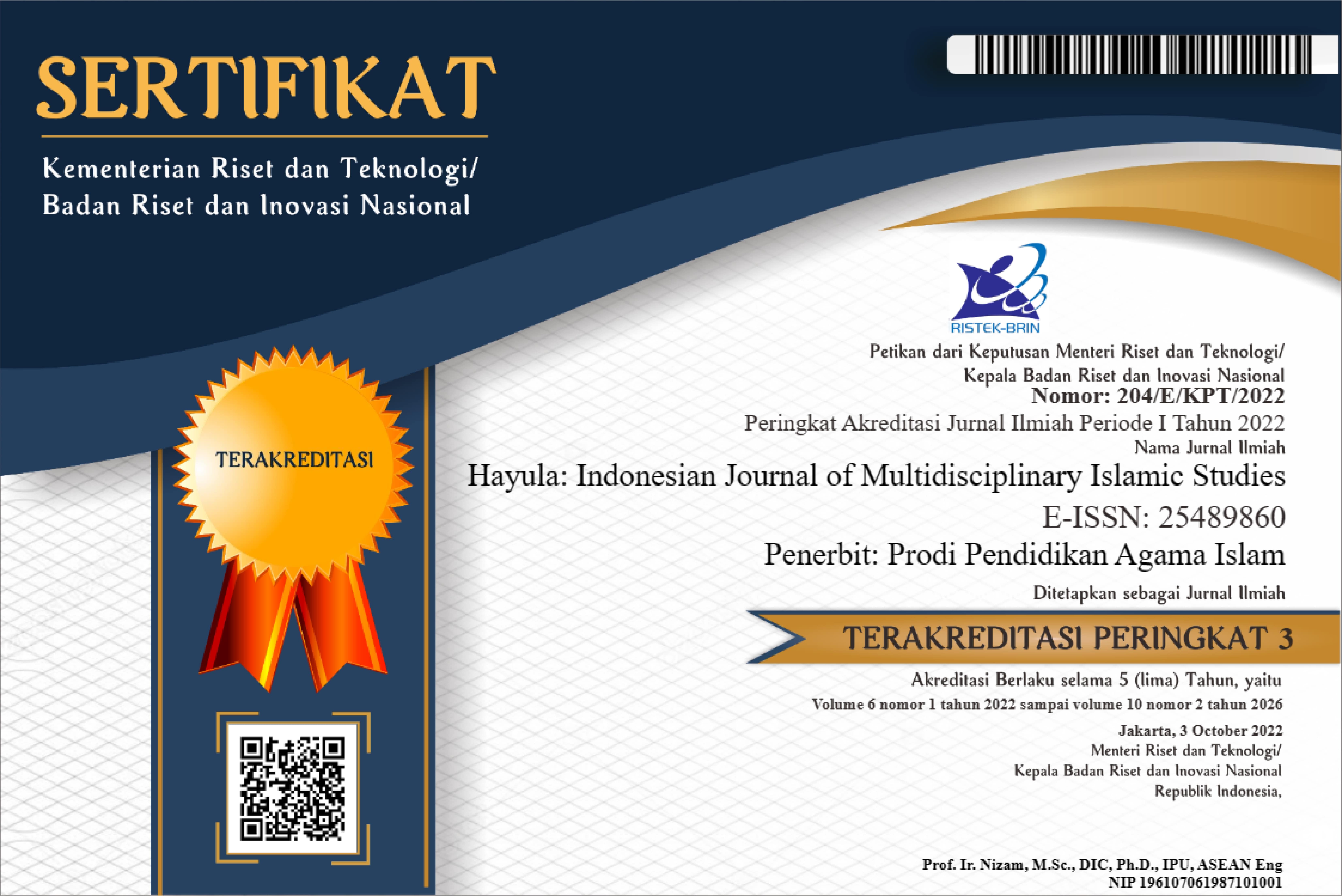Communal Feast Slametan: ‎ Belief System, Ritual, and the Ideal of Javanese Society
DOI:
https://doi.org/10.21009/hayula.001.1.06Keywords:
slametan, Javanese cultures, muslim societiesAbstract
This paper focuses on the Javanese Muslims religious belief and its ritual, slametan, ‎which is prevalently performed in Java. This ritual is of great significance to the ‎Javanese Muslim community, and is counted as syncretistic ritual of Islamic and the ‎Javanese traditions. The ritual is though analysed in relation to the society ideal of unity ‎and harmony as the standard set for the indicator that the life of people is in order and ‎in a slamet condition or ‘nothing happens’. This paper argues that this ceremony is the ‎main ritual among Javanese Muslims which to a large extent reflects and symbolises the ‎religious belief, slamet principle of the people living together, and having strong ‎awareness of others. This ideal in the end conceives some element of sacredness which ‎has the influence on the relationship between individual and social behaviour.‎
References
Budijanto, Bambang, Development in Rural Indonesia. Oxford: Regnum, 2009.‎
Durkheim, Emile, The Elementary Forms of Religious Life, trans. J.W. Swain, London, ‎‎1915.‎
Geertz, Clifford, Religion of Java. Chicago: The Chicago University Press, 1960.‎
Geertz, Clifford, ‘Religious Belief and Economic Behaviour in a Central Javanese Town: ‎Some Preliminary Considerations’ in Hamiltion, ed. Critical Assessment Max Weber ‎volume 1 pp. 259-301. Routledge. Available at ‎http://books.google.com/books?id=p84OAAAAQAAJ&pg=PA264&dq=slametan+‎sacred&lr= accessed on 16 March 2009 at 22.17., 1991.‎
Headley, Stephen C., Durga’s Mosque: Cosmology, Conversion and Community in ‎Central Javanese Islam. Singapore: ISEAS, 2004.‎
Hilmy, Masdar, ‘Islam and Javanese Acculturation: Textual and Contextual Analysis of ‎the Slametan Ritual’ (Master Thesis, McGill University). Available online at ‎http://www.collectionscanada.gc.ca/obj/s4/f2/dsk2/ftp03/MQ50521.pdf accessed ‎on 19 March 2009 at 21.26., 1999.‎
Kim, Hyung-Jun, Reformist Muslims in A Yogyakarta Village: The Islamic Transformation ‎of Contemporary Socio-Religious Life. Canberra: ANU E Press, 2007.‎
Koentjaraningrat, R. M., Javanese Culture. Singapore: Oxford University Press, 1985.‎
Lapidus, Ira, Islamic Societies to the Nineteenth Century: A Global History. Cambridge: ‎Cambridge University Press, 2012.‎
Möller, André, ‘Islam and Traweh Prayers in Java: Unity, Diversity and Cultural ‎Smoothness’ anpere e-journal for the study of anthropology of religion. Available at ‎http://www.anpere.net/2006/7.pdf accessed on16 March 2009 at 23.30., 2006.‎
Mulder, Niels, Mysticism in Java: Ideology in Indonesia. Amsterdam: The Pepin Press, ‎‎1998.‎
Robinson, Kathryn May, Gender, Islam, and Demeocracy in Indonesia. ASAA somen in ‎Asia Series.‎
Ritchie, J. and Jane Lewis, Qualitative Research Practice: A Guide for Social Science ‎Students and Researchers. London: SAGE Publications. ‎
Vickers, Adrian, A History of Modern Indonesia. Cambridge: Cambridge University ‎Press, 2005.‎
Woodward, Mark, Java, Indonesia and Islam. London: Springer, 2011.‎
Yumarma, Andreas, Unity in Diversity: A Philosophical and Ethical Study of the Javanese ‎Concept of Keselarasan. Rome: Pontifical Gregorian University, 1996.‎
Downloads
Published
How to Cite
Issue
Section
License
Authors who publish with this Journal agree to the following terms:
- Author retain copyright and grant the journal right of first publication with the work simultaneously licensed under a creative commons attribution licensethat allow others to share the work within an acknowledgement of the work’s authorship and initial publication of this journal.
- Authors are able to enter into separate, additional contractual arrangementfor the non-exclusive distribution of the journal’s published version of the work (e.g. acknowledgement of its initial publication in this journal).
- Authors are permitted and encouraged to post their work online(e.g. in institutional repositories or on their websites) prior to and during the submission process, as it can lead to productive exchanges, as well as earlier and greater citation of published works.
Users/public use of this website will be licensed to CC BY







